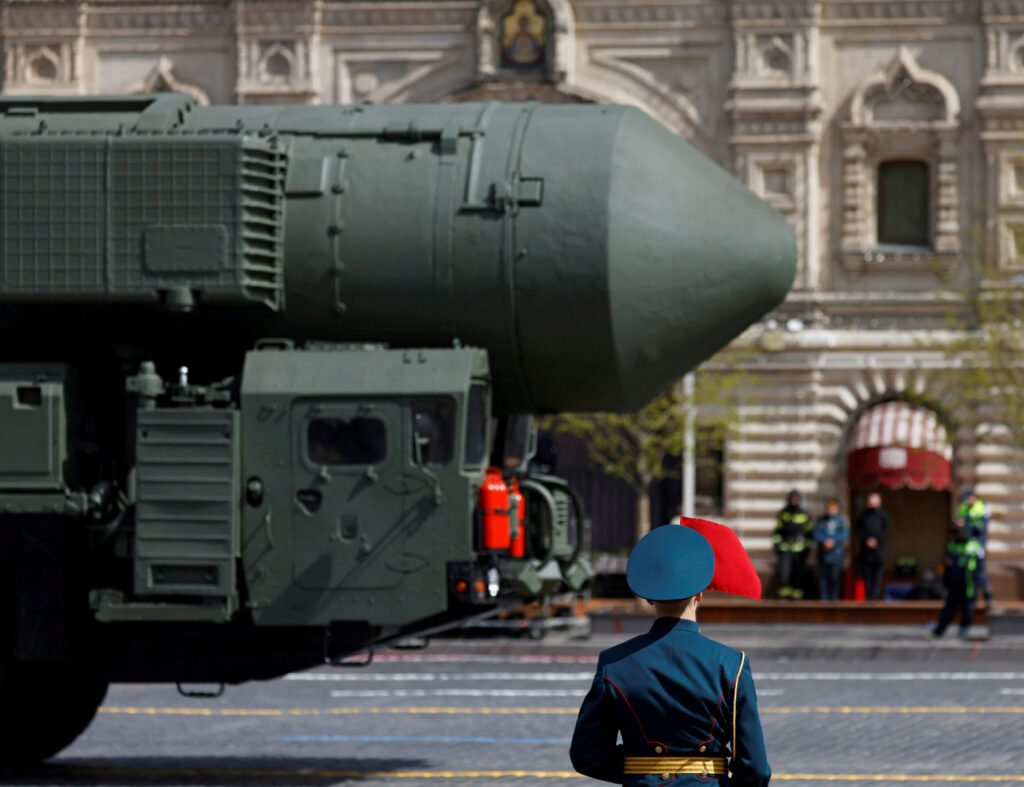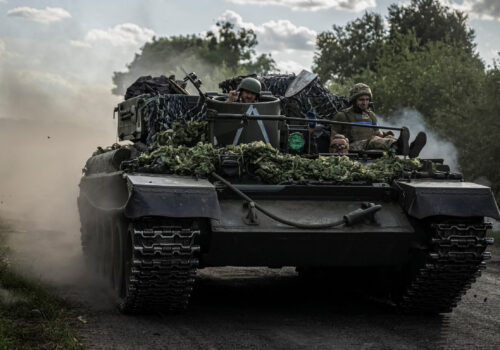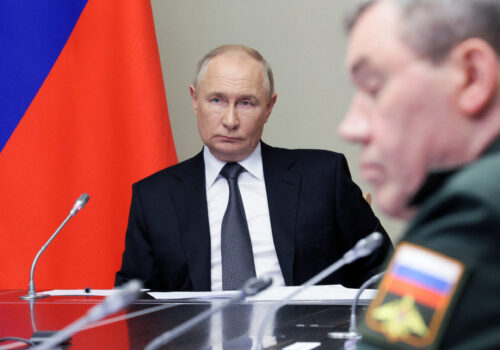
Moscow escalates nuclear threats as Ukraine erases Russia’s red lines

The Kremlin has this week announced plans to revise its nuclear doctrine, less than one month after Ukraine’s surprise invasion of Russia made a complete mockery of Moscow’s frequent nuclear threats. In a September 1 interview, Russia’s Deputy Foreign Minister Sergei Ryabkov confirmed that Russia is in the process of amending its doctrine on the use of nuclear weapons, while accusing the West of fueling an “escalation” of the war with Ukraine.
Russia’s current nuclear doctrine was set out by Vladimir Putin in 2020. It states that the Russian Federation reserves the right to use nuclear weapons in response to a nuclear attack or if “the very existence of the state has been placed under threat.” While there is virtually no chance of the current war triggering either of these clauses, this has not prevented Putin from engaging in regular bouts of nuclear saber-rattling since the start of Russia’s full-scale invasion.
The Kremlin dictator’s nuclear bravado began as soon as Russian tanks first rolled across the Ukrainian border in the early hours of February 24, 2022. In his public address announcing the invasion, Putin warned Western leaders that any attempt to intervene would result in consequences “such as you have never seen in your entire history.” Three days later, he hammered home the point by placing Russia’s nuclear forces on high alert.
This initial nuclear posturing set the tone for the entire invasion, with Putin and other Kremlin officials routinely resorting to thinly veiled nuclear threats in an obvious bid to undermine Western support for Ukraine. During one particularly notorious incident in September 2022 as he prepared to annex large parts of Ukraine, Putin directly referenced his country’s vast nuclear arsenal and vowed to use “all means at our disposal” to defend Russia’s conquests. “This is not a bluff,” he declared.
Russia’s use of nuclear blackmail has been widely condemned as reckless, but there is no escaping the fact that it has proved highly effective against risk-averse Western leaders. Since February 2022, Moscow’s nuclear threats have fueled a culture of escalation management in Western capitals that has consistently restricted the flow of arms to Kyiv and led to the imposition of absurd restrictions on Ukraine’s right to defend itself. Indeed, Putin’s ability to intimidate the West has arguably been his greatest success of the entire war.
Stay updated
As the world watches the Russian invasion of Ukraine unfold, UkraineAlert delivers the best Atlantic Council expert insight and analysis on Ukraine twice a week directly to your inbox.
While the Kremlin’s nuclear saber-rattling has clearly worked against the West, it has had far less of an impact in Kyiv. Throughout the war, Ukraine has repeatedly demonstrated a readiness to call Putin’s bluff and has displayed an almost complete lack of concern over crossing Russia’s so-called red lines.
In late 2022, Putin declared that Ukrainian provincial capital Kherson had joined Russia “forever.” Just weeks later, Ukraine liberated the city. Rather than reach for his nuclear button, the Russian ruler gave the order for his defeated troops to retreat across the Dnipro river. Similarly, when Ukraine ignored Moscow’s many graphic warnings and proceeded to sink or seriously damage around one-third of the entire Russian Black Sea Fleet, this did not spark World War III. On the contrary, Putin quietly instructed his remaining warships to withdraw from Crimea to the relative safety of Russian ports.
The most serious blow to the credibility of the Kremlin’s nuclear threats has come in recent weeks with Ukraine’s cross-border offensive into Russia’s Kursk Oblast. By invading Russia itself, Ukraine has crossed the reddest of all Russian red lines. And yet once again, Putin has chosen not to escalate. Far from unleashing nuclear Armageddon, he has actively sought to downplay Ukraine’s invasion, referring to it as a “provocation” and pretending that the first foreign occupation of Russian soil since World War II is nothing out of the ordinary.
Eurasia Center events
Putin’s lackluster reaction to the Ukrainian invasion of Russia has not gone unnoticed. Ukrainian President Volodymyr Zelenskyy in particular has seized on this weak response and called for an end to all restrictions on the use of Western weapons inside Russia. “The whole naive, illusory concept of Russian red lines, which prevailed in the assessments of the war among some of our partners, crumbled in these days somewhere near Sudzha,” Zelenskyy commented, referring to a Russian town in Kursk Oblast currently under Ukrainian occupation.
Kremlin officials also appear to recognize the danger, and are doubtless acutely aware that Ukraine’s invasion of Russia has left their nuclear threats looking increasingly empty. This would certainly explain their current interest in revising Russia’s nuclear doctrine. It is not yet clear what form these revisions may take, but it seems safe to assume that any changes will lower the threshold for nuclear use, and will be carefully calibrated to reintroduce the fear factor and send an unambiguous message of deterrence to Ukraine’s allies. Unless Western leaders finally stand up to this nuclear blackmail and demonstrate that they no longer prepared to be bullied, the consequences could be catastrophic.
Russia’s normalization of nuclear threats is unprecedented and represents the gravest challenge to international security since the end of the Cold War. If Western leaders allow Putin’s nuclear threats to succeed in Ukraine, he will inevitably use the same tactics against other victims. This will provide inspiration for fellow autocratic regimes. Meanwhile, others will note the West’s inaction and conclude that they are no longer safe without nuclear weapons of their own. Within a few short years, the world could be faced by a nuclear arms race that would undo decades of nonproliferation progress and usher in a dangerous new era of international relations where the prospect of nuclear war is no longer unthinkable.
The only way to avoid this disastrous descent into nuclear insecurity is by stopping Russia in Ukraine. For the past two and a half years, Western fear of escalation has been Putin’s most potent weapon. It is time he was disarmed.
Peter Dickinson is editor of the Atlantic Council’s UkraineAlert service.
Further reading
The views expressed in UkraineAlert are solely those of the authors and do not necessarily reflect the views of the Atlantic Council, its staff, or its supporters.

The Eurasia Center’s mission is to enhance transatlantic cooperation in promoting stability, democratic values and prosperity in Eurasia, from Eastern Europe and Turkey in the West to the Caucasus, Russia and Central Asia in the East.
Follow us on social media
and support our work
Image: A Russian Yars intercontinental ballistic missile system drives past an honour guard during a military parade on Victory Day, which marks the 77th anniversary of the victory over Nazi Germany in World War Two, in Red Square in central Moscow, Russia. May 9, 2022. (REUTERS/Maxim Shemetov)





